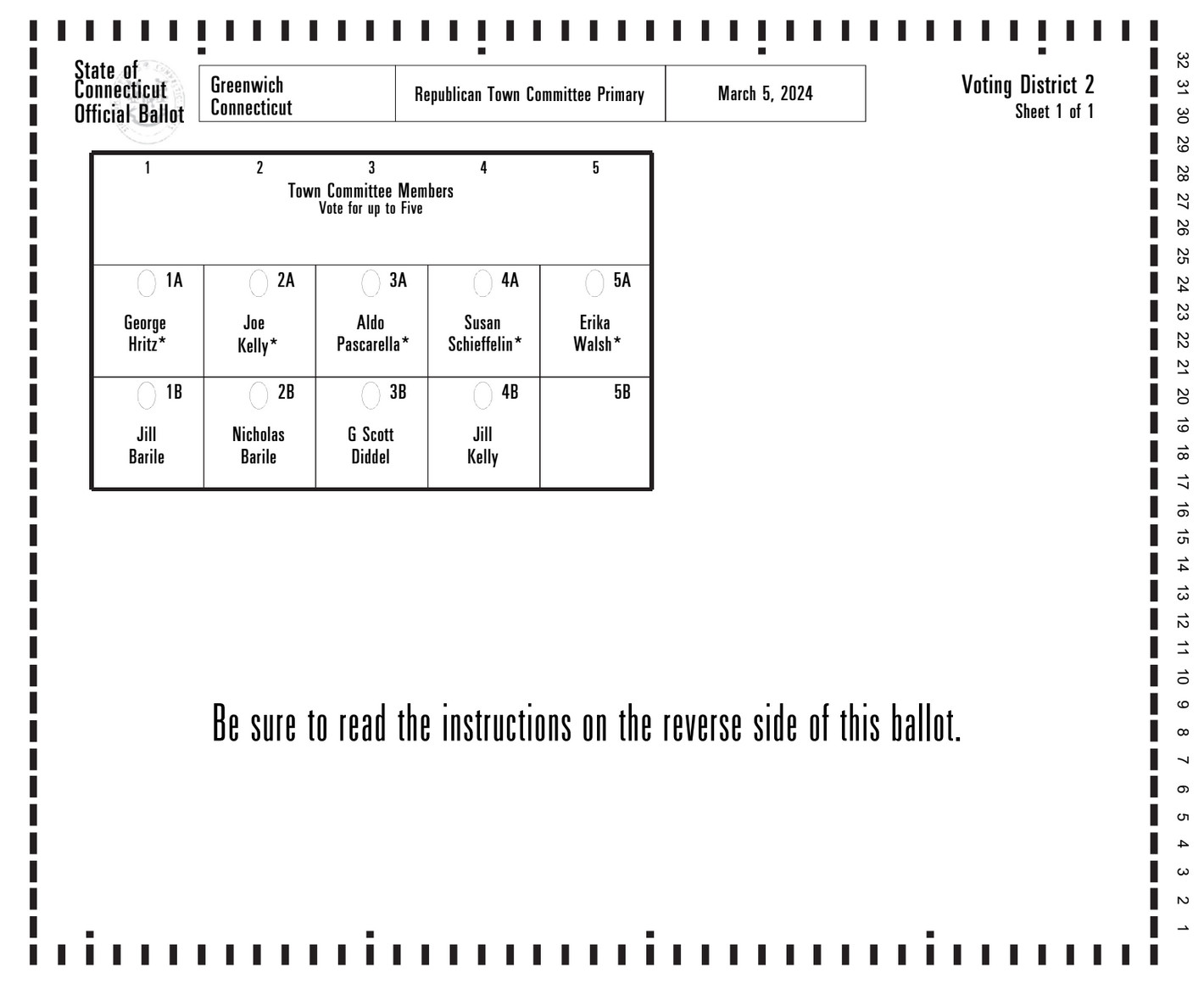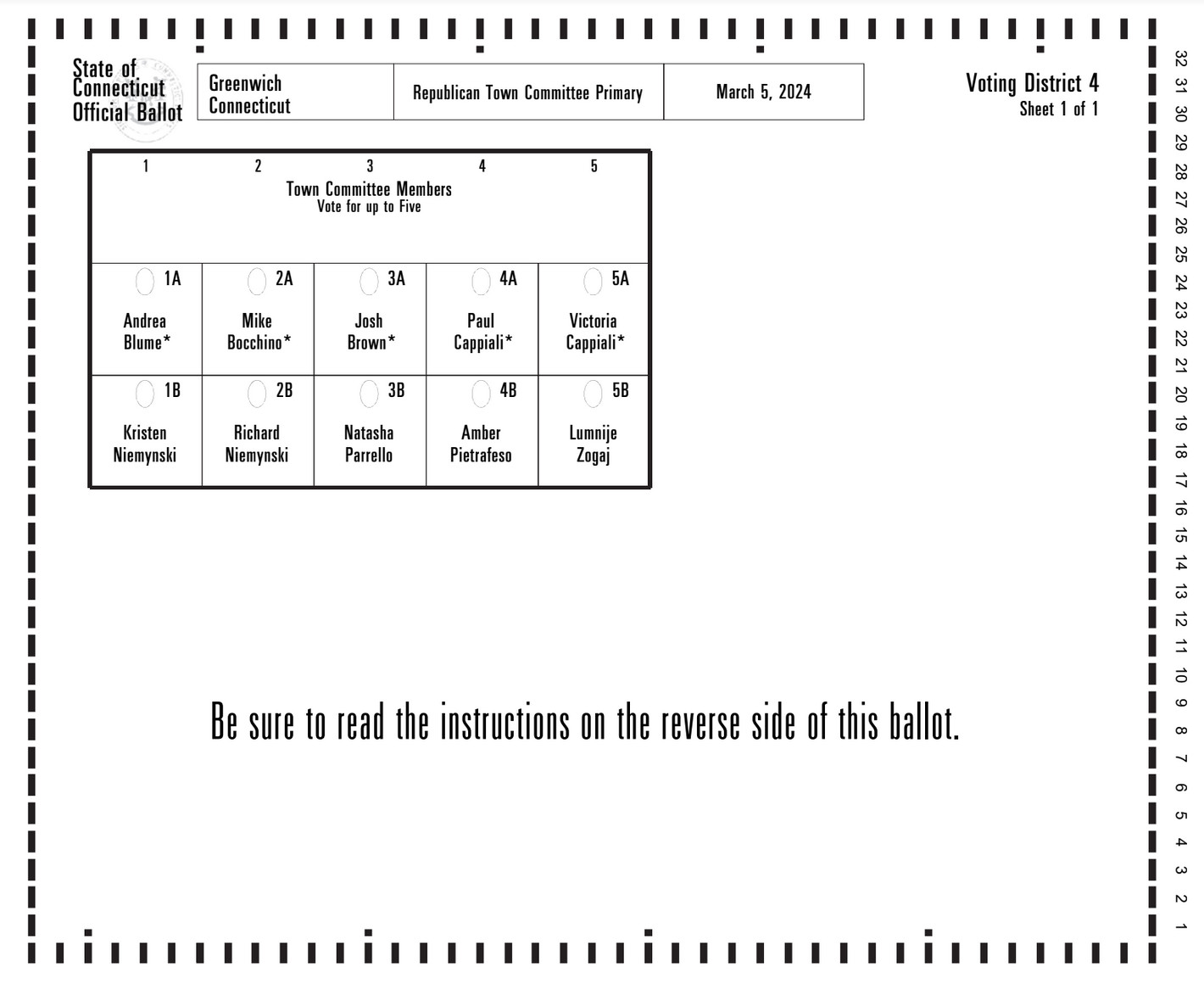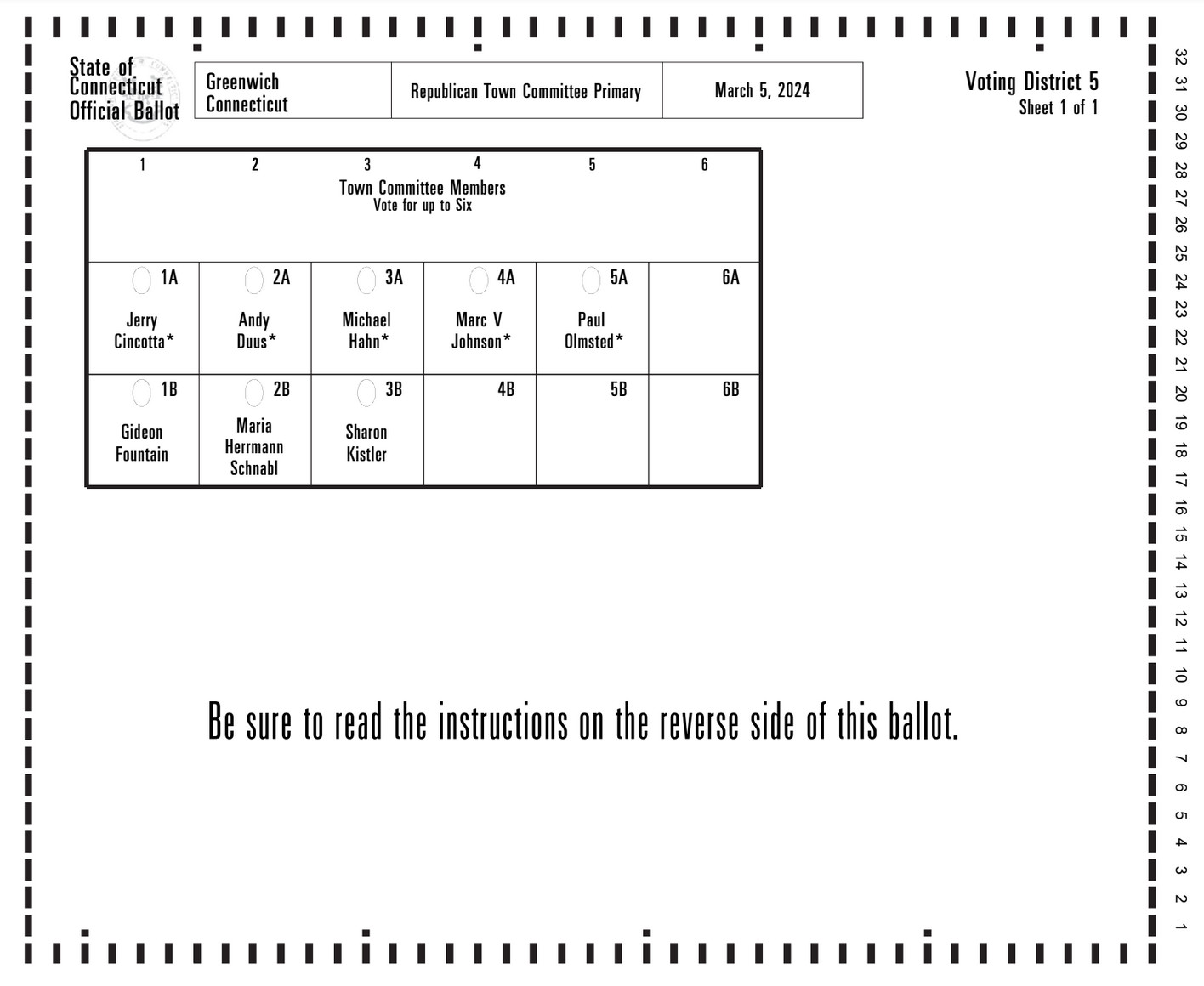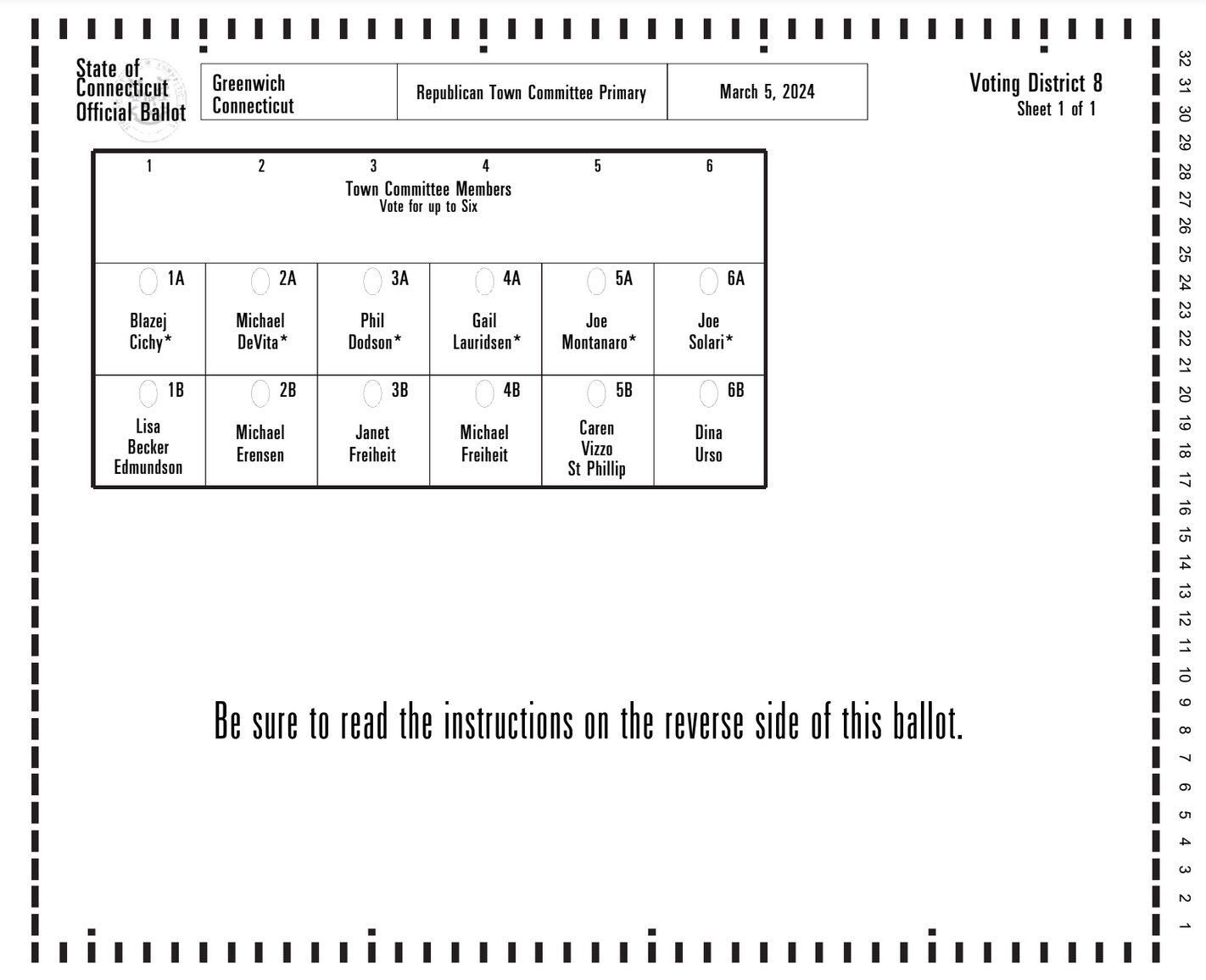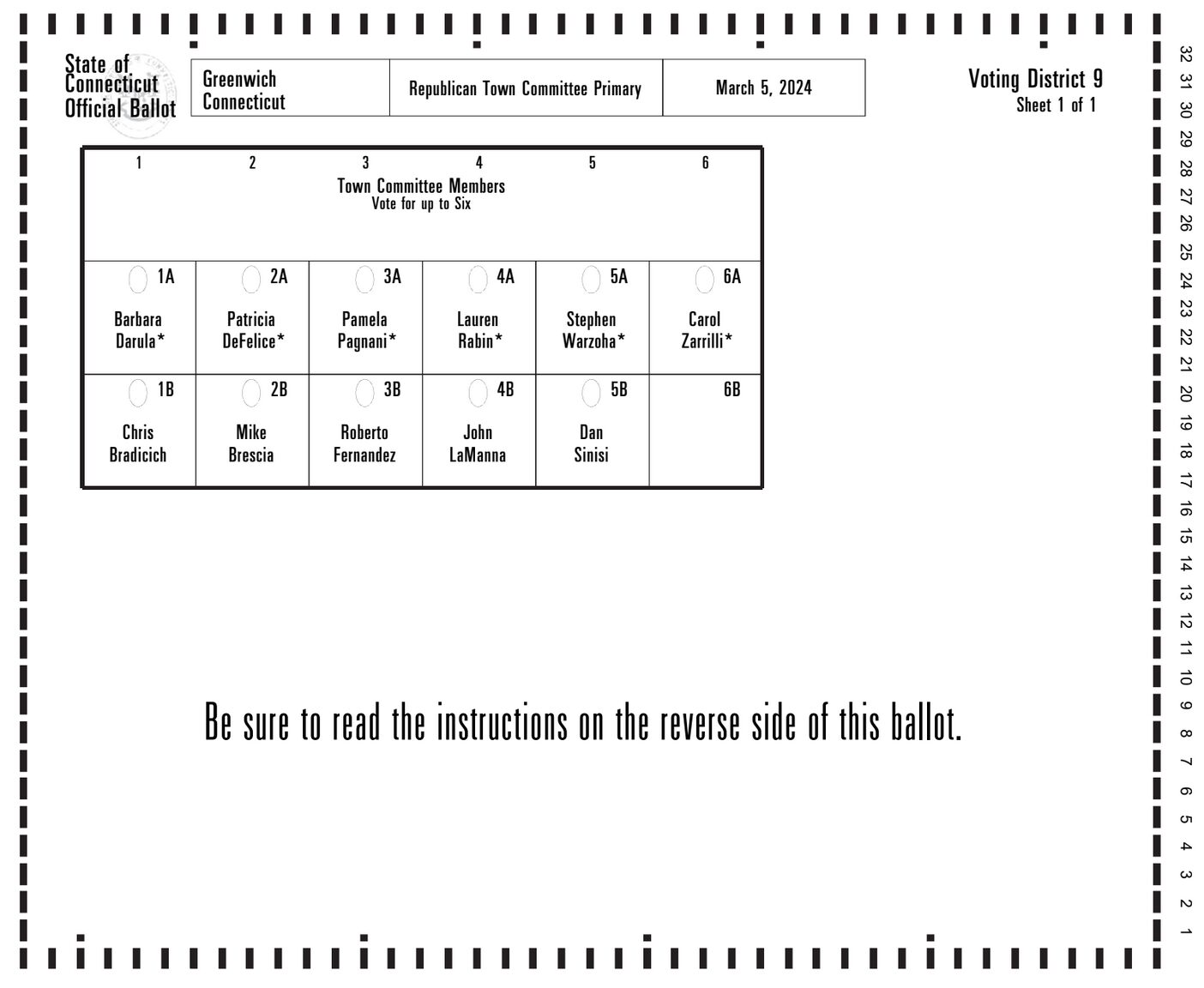A primary election for the Republican Town Committee is set for March 5 in five of Greenwich’s 12 districts: 2, 4, 5, 8 and 9.
The elections are only for registered Republicans who live in those districts.
The Registrars of Voters are running the primaries. The entire process is dictated by state law.
According to Republican Registrar of Voters Fred DeCaro – now in his 16th year in office – the difference between the caucuses the RTC held in January and the March 5 primaries is that the caucuses were considered ‘a party endorsement process.’
There was always a chance the caucuses could lead to primaries by Republicans in any district who are opposed to the endorsed candidates and want to be considered.
Signatures can be collected to force a primary which might override that endorsement.
All a candidate is required to do is submit a petition with signatures of 5% of the Republican registrants in the district.
In fact, that process is no different than when the town committee endorses a candidate for First Selectman, State Senator or Tax Collector, for example.
“These things do happen on occasion,” DeCaro said. “There may even be a few more of them this year. While we don’t have a huge number of them, in Stamford where they have 20 districts, 17 of their Democratic districts are having primaries next week on the same day Greenwich will have their five RTC primaries.”
Primaries are not uncommon
DeCaro said that while five primaries is a lot for Greenwich, there have been primaries in the past.
“In addition to the year 2000, there was one in 2018 and one in 2022,” he recalled. “This is actually the fourth time this has happened this millennium.”
DeCaro recalled there was a DTC primary for tax collector in 2006 involving Bill Grad and then Democratic convert Rick Novakowski who both wanted to challenge Tod Laudonia.
In March 2022 a primary in District 1 took place after 21 RTC incumbents lost their seats in the January caucuses. Then RTC chair Dan Quigley came in 5th in a tie at the caucus, but won in a runoff against newcomer Joe Borelli. Then, in the March 2022 primary, Quigley lost, along with Fred Lee who had also won in the January caucuses.
What may be unique today is that going into the March 5 primaries there are escalating disputes, one of which has led to an SEEC complaint being filed in District 5 accusing members of the RTC with forging petition candidate signatures to get 3 candidates into spots in the District 5 March 5 primary ballot.
In some districts, endorsed candidates are being primaried by new candidates. In other districts candidates who lost to RTC endorsed slates are primarying to reverse those January results.
There have been several letters to the editor submitted from primary candidates.
Memories in the Vault
DeCaro, who has done work for the Registrars office in Greenwich for 24 years – starting as a volunteer poll worker doing absentee ballot counting for the deputy registrar – recalled being intrigued by the process early on.
“My predecessor used to hire two accountants – a Democrat and a Republican – and when all the numbers came in at night they turned them over to the accountants to tally. If they didn’t match, they’d go and reconcile themselves,” he recalled. “Now we have a 4-person team all observing the process. One person reading tapes, one typing, one listening to what’s being read and a final person is listening to what is read and what’s being typed – in every election.”
DeCaro said his very first experience was at an RTC primary that included District 12 back in 2000. It was the year the RTC primary happened to be the same day as the presidential primary of 2000.
“I was asked by one of the primary candidates to be in the absentee ballot counting room as a volunteer to make sure everything was kosher,” he recalled.
At the time he said, “The experience let me know we had a lot of problems.”
That particular primary took place before there were tabulators for absentee ballots. Instead, voters marked their choices with X’s and the ballots were later hand-counted with a team of people reading the ballots out loud and transcribing them onto gigantic counting sheets.
“One person would read and one person would mark, and then when done with the pile they’d reverse it, and then they’d compare the sheets to make sure they had the same answers,” DeCaro recalled. “Winona (Mullis) and I were in the front row, and there were two elderly gentlemen behind us with a huge stack of ballots. It must have been about 900 ballots.”
“It turns out it was the stack was for District 12. The first guy goes through them, and by that time they’re both exhausted and one guy says to the other, ‘We’ve got to count them again,’ and the other guy says, ‘Just copy off my sheet.'”
“So I go up to the Republican assistant registrar and say, ‘It’s my first time here but I don’t think they’re doing it right.’ She walks over to these guys and says, ‘Remember, we’re counting twice, and they say, ‘Oh yes, we’re about to start the second count.'”
“As she walked away I ask, ‘Why is the second sheet half filled in already? The moderator Steve Olszewski comes over to me and kneels down and says, ‘You know, you’re not making any friends in this room.'”
“I said I didn’t think I was here to make friends,” DeCaro recalled. “By lunchtime I, these guys still can’t get the piles straight. So as a reward they give it to Winona (Mullis) and me to count.”
DeCaro and Mullis hand-counted the absentee ballots, and the experience inspired DeCaro to begin to study and learn about election administration, ultimately becoming the elected Republican Registrar of Voters in 2008.
Mullis recounted the story in a 2020 Letter to the Editor in GFP in 2020.
Costs to the Town
Of course the RTC primaries will come at a cost to the town.
Costs include custodians, police, ballots, tabulator programming, 25+ poll workers, Dept of Public Works costs to transport equipment and set up polling places, as well as some staff overtime for the additional training sessions the Registrars offices are required to conduct before every election. Those are done on evenings and Saturdays. And of course there is the cost of any potential recounts.
On March 5, three districts will vote inside public school buildings where school will be in session.
At Thursday’s Board of Education meeting Dr. Jones said extra police woul be present at the schools that are polling places.
“I want to assure the community that in those three buildings impacted – CMS, New Lebanon and Riverside – we do have additional police on hand that day for security should people need to vote during school hours.”
Republican BOE member Michael-Joseph Mercanti-Anthony added a comment, “When people engage in nonsensical political games, it has real impact on our schools and our system. It’s important to realize the resources and impact it has on the schools when we engage in such nonsense.”
More Fun Facts for Voters
DeCaro said for anyone currently enrolled in a party, it is too late to change from one party to the other.
However, anyone who is an unaffiliated voter may join the Republican party up until 12:00 noon the day before the primary.
Anyone who was unclear about the status of their voter registration can check online here.
Polls will be open on March 5 from 6:00am to 8:00pm.
Since school will be in session on March 5, voters are being encouraged to vote before or after school or fill out an absentee ballot.
Town Clerk Jackie Budkins has announced special hours at her office on Saturday, March 2, from 8:00am until 12:00 noon for anyone looking to get an absentee ballot for the election.
It is possible for voters to get a ballot from the Town Clerk’s Office or fill out an application online here and then either mail it or bring it to the Town Clerk’s Office.
People can also use the secure drop boxes in the Town Hall visitor parking lot, the Town Hall lobby or the lobby in the Public Safety Complex to drop off their ballots.
DeCaro shared the preview of the ballots in the five districts where Republicans can vote in a primary on March 5:
